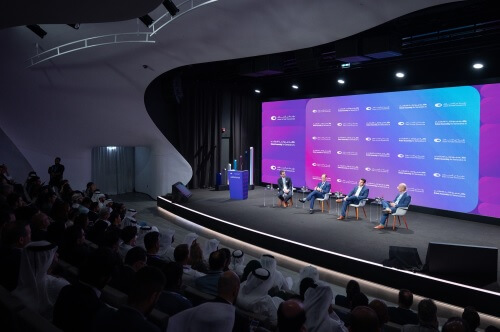During the Dubai Artificial Intelligence Forum, Quantum Black has affirmed that the development of artificial intelligence does not equate to job loss.
Dubai, October 12 - At the Dubai Artificial Intelligence Forum, Chiara Marchati, Partner for Data, Advanced Analytics, and Generative Artificial Intelligence at Quantum Black by McKinsey, emphasized that a successful and productive generative artificial intelligence will primarily focus on asking the right questions to obtain effective answers, solutions, and fruitful applications.
These insights were shared during the opening address delivered by Marchati titled "The State of Artificial Intelligence in 2023: Beyond the Growth Boom" at the Dubai Artificial Intelligence Forum, held under the patronage of His Highness Sheikh Hamdan bin Mohammed bin Rashid Al Maktoum, Crown Prince of Dubai, Chairman of the Executive Council, and Chairman of the Board of the Dubai Future Foundation, on October 11 and 12 at the "Museum of the Future" and "Zone 2071" in the Emirates Towers in Dubai.
"We have 60 years of computer models, 40 years of the internet, and the largest wealth of data, along with 20 years of mobile phone usage, which enables us to have high-performance computers and systems that leverage generative artificial intelligence," stated Marchati.
She explained that the developments in artificial intelligence do not imply job loss, saying, "McKinsey conducted interviews with over 3,000 business leaders and found that they aim to use this technology to boost productivity by 20-30%, depending on the type of work."
During a second-day dialogue session at the forum, which explored the applications of artificial intelligence in vital sectors and opportunities to accelerate growth in financial services, travel and hospitality solutions, and the biological sciences, Owen Lydon, Associate and Head of Life Sciences at Quantum Black, stated that generative artificial intelligence has already made inroads. In 2022, the development of experimental models has begun, particularly in areas such as report generation, medical writing, documentation, and research. He emphasized the existence of applications known as co-pilots, where artificial intelligence accompanies users in their daily tasks.
Lydon estimated that generative artificial intelligence results have already started to appear in the understanding and assessment of patient medical histories and records, leading to the formation of an integrated view of their health records, thus enhancing future patient care opportunities and improving the efficiency of healthcare management facilities and institutions.
Lydon emphasized that decision-makers are humans and hold the responsibility for managing the applications of generative artificial intelligence, particularly in the medical and healthcare sectors and biological science research. He stressed the necessity of transparency for the success of these applications.
Larry Lerner, Associate and Director of Financial Services and Generative Artificial Intelligence at Quantum Black, confirmed that the banking sector stands to benefit significantly from generative artificial intelligence techniques, presenting a substantial opportunity over the coming years, estimated to be worth between $300 and $400 billion. He noted that banks are at the forefront of three key areas that will benefit the most: customer service, data and software updates, and virtual applications, whether in marketing, operations, legal compliance, or human resources.
Lerner added, "The insurance sector will benefit from generative artificial intelligence, which will be able to delve into decades-old data for analysis and modeling, preparing the best formulas for insurance policies and claims settlement. This will facilitate and expedite transactions for clients and companies."
Meanwhile, Alex Kosmas, Associate and Director of Advanced Analytics for Travel, Transportation, and Logistics at Quantum Black, believes that critical sectors such as aviation, tourism, travel, and hospitality are rapidly benefitting from generative artificial intelligence. He emphasized the focus on big data analysis to understand evolving trends and customer needs.
Kosmas concluded by stating, "The human element is essential and indispensable in the aviation sector and related industries. However, generative artificial intelligence promises to construct standard models that will facilitate the tasks of this human element."
The session concluded that generative artificial intelligence can be applied in banking services through numerous applications, including personalized customer experiences and back-end process automation, in biology by using artificial intelligence models to predict protein structures and properties, and in the travel and hospitality sector by improving demand forecasts and pricing strategies.
During the first day of the Dubai Artificial Intelligence Forum, Quantum Black McKenzie held a special session in collaboration with the Dubai Center for Artificial Intelligence Uses, titled "An Overview of Global Trends and Government Initiatives in Artificial Intelligence." The session focused on the role of government agencies in governing emerging artificial intelligence application models and directing them to serve individuals, institutions, societal sectors, and businesses.
On the second day, a special session was held in partnership with the Dubai Center for Artificial Intelligence Uses titled "Opportunities for Generative Artificial Intelligence and Their Economic Impacts."
As part of the forum activities, Quantum Black organized an exhibition titled "A World Record in Formula E Racing," supported by McKinsey's artificial intelligence. The exhibition highlighted the role of artificial intelligence in extrapolating and analyzing data, leading to unprecedented differences in electric vehicle speed races.



